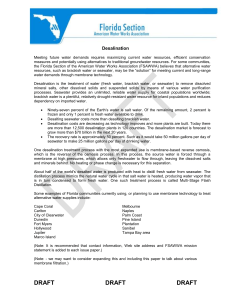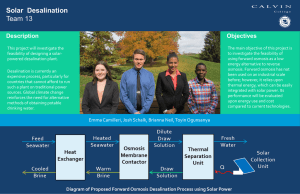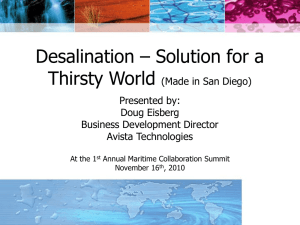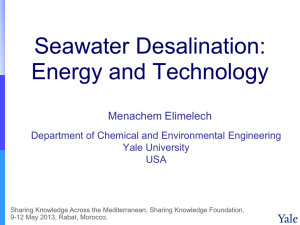Membrane Desalination Power Usage Put in Perspective
advertisement
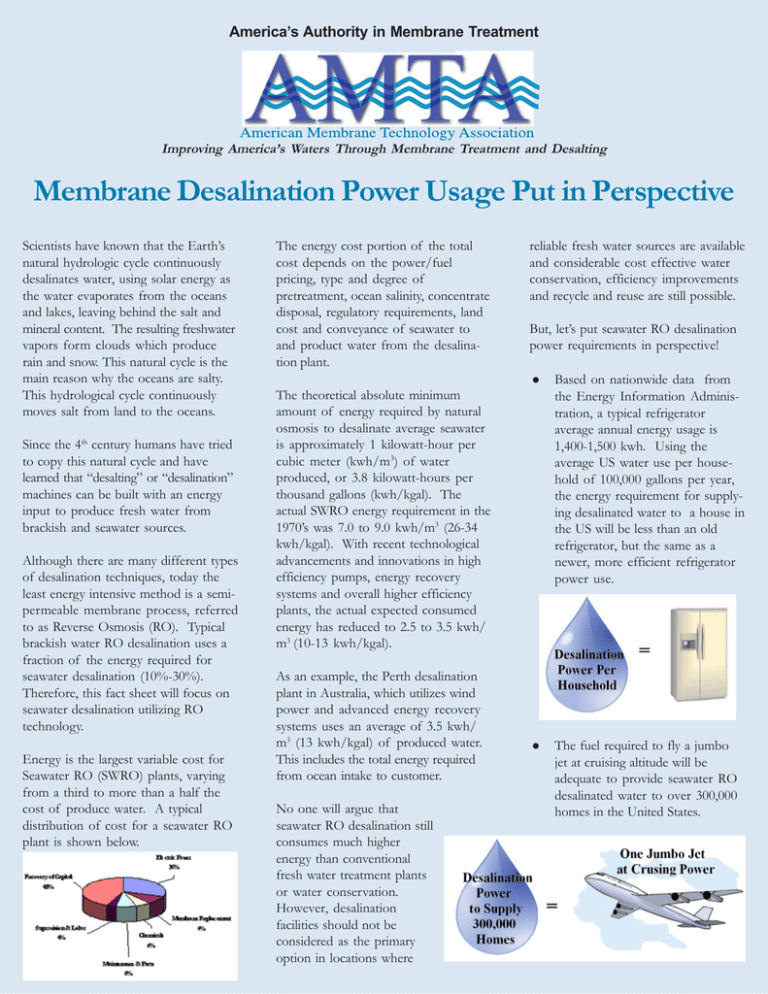
America’s Authority in Membrane Treatment Improving America’s Waters Through Membrane Treatment and Desalting Membrane Desalination Power Usage Put in Perspective Scientists have known that the Earth’s natural hydrologic cycle continuously desalinates water, using solar energy as the water evaporates from the oceans and lakes, leaving behind the salt and mineral content. The resulting freshwater vapors form clouds which produce rain and snow. This natural cycle is the main reason why the oceans are salty. This hydrological cycle continuously moves salt from land to the oceans. Since the 4th century humans have tried to copy this natural cycle and have learned that “desalting” or “desalination” machines can be built with an energy input to produce fresh water from brackish and seawater sources. Although there are many different types of desalination techniques, today the least energy intensive method is a semipermeable membrane process, referred to as Reverse Osmosis (RO). Typical brackish water RO desalination uses a fraction of the energy required for seawater desalination (10%-30%). Therefore, this fact sheet will focus on seawater desalination utilizing RO technology. Energy is the largest variable cost for Seawater RO (SWRO) plants, varying from a third to more than a half the cost of produce water. A typical distribution of cost for a seawater RO plant is shown below. The energy cost portion of the total cost depends on the power/fuel pricing, type and degree of pretreatment, ocean salinity, concentrate disposal, regulatory requirements, land cost and conveyance of seawater to and product water from the desalination plant. reliable fresh water sources are available and considerable cost effective water conservation, efficiency improvements and recycle and reuse are still possible. But, let’s put seawater RO desalination power requirements in perspective! Based on nationwide data from the Energy Information Administration, a typical refrigerator average annual energy usage is 1,400-1,500 kwh. Using the average US water use per household of 100,000 gallons per year, the energy requirement for supplying desalinated water to a house in the US will be less than an old refrigerator, but the same as a newer, more efficient refrigerator power use. The fuel required to fly a jumbo jet at cruising altitude will be adequate to provide seawater RO desalinated water to over 300,000 homes in the United States. The theoretical absolute minimum amount of energy required by natural osmosis to desalinate average seawater is approximately 1 kilowatt-hour per cubic meter (kwh/m3) of water produced, or 3.8 kilowatt-hours per thousand gallons (kwh/kgal). The actual SWRO energy requirement in the 1970’s was 7.0 to 9.0 kwh/m3 (26-34 kwh/kgal). With recent technological advancements and innovations in high efficiency pumps, energy recovery systems and overall higher efficiency plants, the actual expected consumed energy has reduced to 2.5 to 3.5 kwh/ m3 (10-13 kwh/kgal). As an example, the Perth desalination plant in Australia, which utilizes wind power and advanced energy recovery systems uses an average of 3.5 kwh/ m3 (13 kwh/kgal) of produced water. This includes the total energy required from ocean intake to customer. No one will argue that seawater RO desalination still consumes much higher energy than conventional fresh water treatment plants or water conservation. However, desalination facilities should not be considered as the primary option in locations where Based on the data from the Office of the Energy Markets and End Use, the average annual household energy power consumption is 11.0 MW. If the entire community is served by seawater desalinated water, the annual power required for the desalination plant to serve a house is 1.0 MW, or an increase of less than 10%. throughout the world with water crises, it would be more beneficial to all of us as a community to: Find ways of improving desalination technology to further reduce the power requirements. Find and expand other carbonneutral energy sources such as wind, solar, nuclear and other innovative methods. In most cases, however, the existing traditional supply sources are augmented with seawater and/ or brackish water desalinated waters, which further reduces the percent increase to typically less than 5%. The California Desalination Task Force estimates that if all the currently proposed seawater desalination plants in California were built, it would add 200 megawatts (mw) to the state’s peak load of 52,000 mw, or less than 0.4%. Opponents of seawater desalination typically only focus on the energy consumption and the climate impacts associated with the increased power generation. Instead of opposing a technology that is helping many areas Ease the process of co-locating desalination and power plants to take advantage of the discarded thermal energy, reduce the burden on the power grid and make use of the lower off-peak power costs. Water agencies can also incorporate the value of the reliability and water quality advantages of membrane desalination when comparing traditional supplies (if available) to desalination. With recent concerns over the discovery of pharmaceuticals and personal care products in drinking water supplies, it is only fair that such comparisons include values and advantages of membrane technologies. Additionally, the value of seawater desalination, a new supply, which is under local control and is essentially independent of climate changes and land use, should be carefully considered when comparing desalination to other alternatives. This material has been prepared as an educational tool by the American Membrane Technology Association (AMTA). It is designed for dissemination to the public to further the understanding of the contribution that membrane water treatment technologies can make toward improving the quality of water supplies in the US and throughout the world. For more information, please contact: American Membrane Technology Association (AMTA) 2409 SE Dixie Highway Stuart, Florida 34996 Phone: (772) 463-0820 Fax: (772) 463-0860 Email: admin@amtaorg.com or visit our website at: www.amtaorg.com In summary, when traditional supply sources are not feasible or available, seawater desalination can be achieved in an environmentally friendly manner, without aggravating climate change concerns. (FS-7) April 2016
